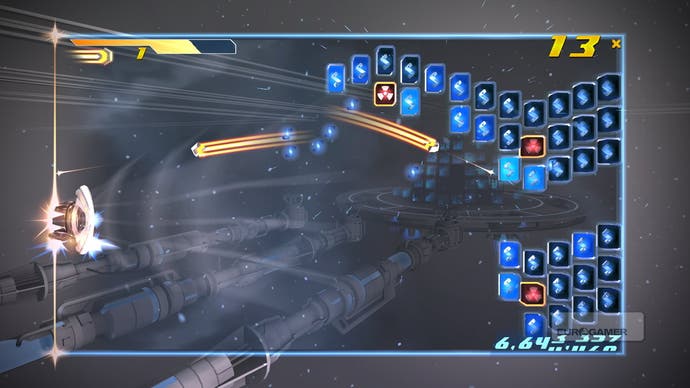Shatter
Block-rocking bats.
Shatter - and this is something you don't often say of download games that cost less than a fiver - has an absolutely fantastic soundtrack. For the new PSN game by GripShift creators Sidhe, Module (aka Jeremiah Ross, a New Zealand electronica artist) has put together 90 minutes of warm, fat, fuzzy bass grooves over steady disco beats and under tidal washes of space-age synth, cut through with heroic stadium-rock guitar and sprinkled in pure, unadulterated SID-chip stardust.
It's quintessentially eighties but also distinctly modern, as close to Justice as it is Harold Faltemeyer. Where other neon-edged arcade revivals try to bring the aesthetic of old videogames "up to date" with thumping psychedelic rave that barely scrapes its way into the 21st century, Sidhe and Module have come up with something that's simultaneously more nostalgic and more relevant - not to mention more human, prettier, and easier to listen to for long periods without having queasy flashbacks to lost weekends. Classy, relaxed and quietly immaculate, the Shatter soundtrack is a perfect piece of retro-futurism. And so is Shatter itself.
It's not as easy as it looks to tackle the classic designs of the very early days of videogaming and innovate around them. It's even harder to actually improve them on a basic level, but that's just what Sidhe has done with Atari's venerable Breakout - or perhaps Taito's Arkanoid, the 1986 game that perfected the form, is a better point of reference. Shatter does for the bat-and-ball block-breaker what Geometry Wars: Retro Evolved did for the twin-stick shooter, or Pac-Man Championship Edition did for the yellow-thing-running-away-from-ghosts-in-a-maze-'em-up. Well, it doesn't quite match them in one area, but we'll get to that later.
The neglected netherworld of the Breakout clone hasn't seen a distinctive update in over a decade. The last notable version was probably the 1996 shareware cult DX-Ball. Ever since, it's been languishing on mobile phones, which is where games designers put all the solid old gametypes they don't know what to do with.

Sidhe freshens the template up in all the ways you'd expect, varying the size and shape of the playing field, adding power-ups, a layered scoring system, modern physics and a proliferation of new block types with different behaviours. It also adds one major innovation you wouldn't expect and would never have thought of: the ability to suck and blow waves of air from your bat, which doesn't just affect power-ups and other collectables, but also the loose, tumbling blocks themselves and - most importantly - the ball, allowing you to bend its trajectory while it's in mid-flight.
Combined with this game-changing twist are two much more subtle, but still brilliant touches. The surface of your bat is gently curved, meaning the ball produces a different bounce depending on where you strike it. It's a much more intuitive and predictable way to give the player more control than the vague notions of spin favoured by some games of this type. Also, there's a light but very precise indicator showing where the ball will hit if it continues on its current trajectory, which is essential for controlling the flight of the ball to the fullest extent, and which doesn't make Shatter as easy as you might think.
All of this gives the player an unprecedented amount of power and flexibility in a genre that's often frustratingly random, or at least, a test of reactions rather than skill and strategy. Shatter is still a game of chance at heart, but it's one where you have the tools to turn the tables on luck every once in a while, if you think fast and play creatively.


